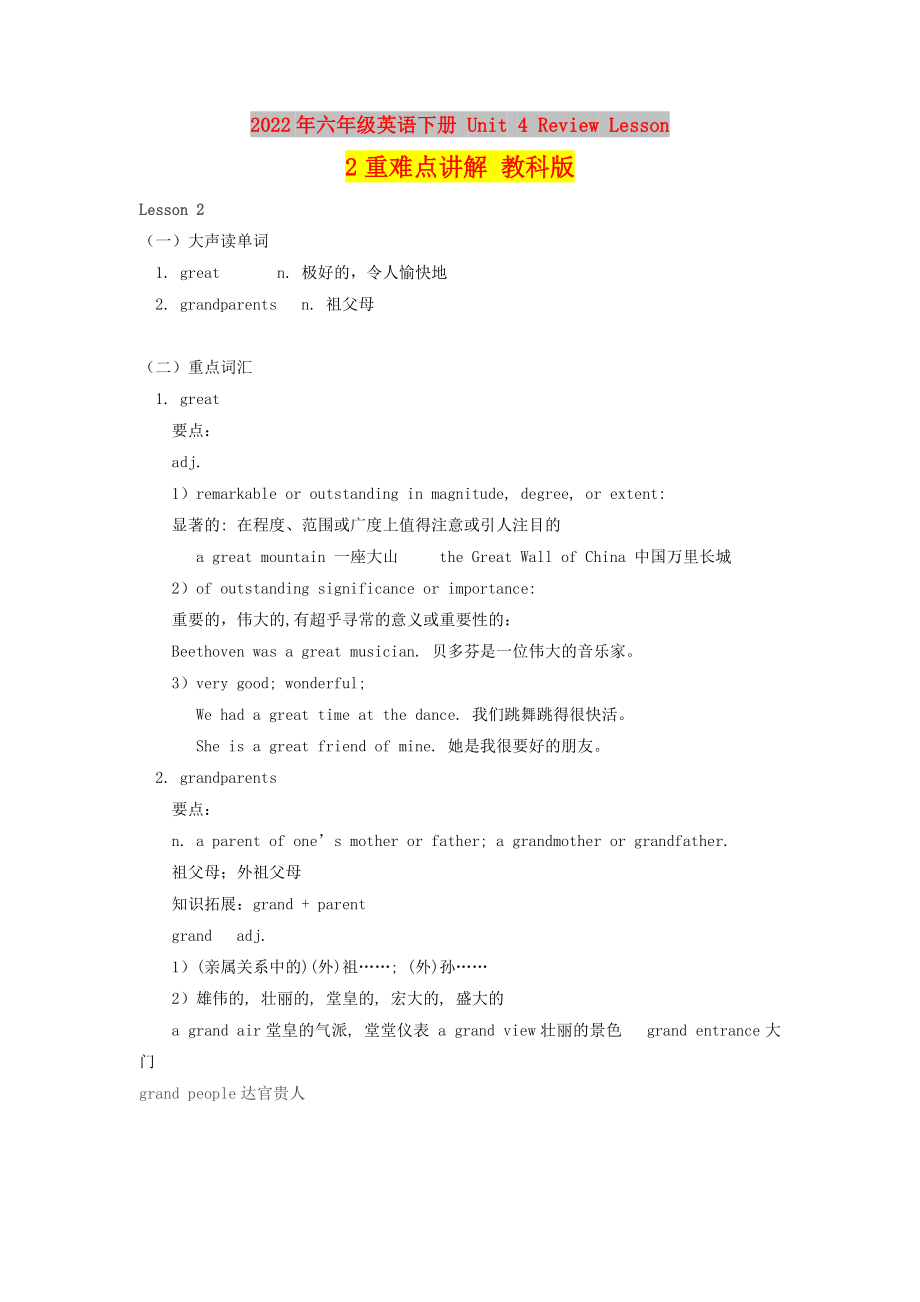《2022年六年級(jí)英語(yǔ)下冊(cè) Unit 4 Review Lesson 2重難點(diǎn)講解 教科版》由會(huì)員分享�,可在線閱讀�,更多相關(guān)《2022年六年級(jí)英語(yǔ)下冊(cè) Unit 4 Review Lesson 2重難點(diǎn)講解 教科版(3頁(yè)珍藏版)》請(qǐng)?jiān)谘b配圖網(wǎng)上搜索�����。
1���、2022年六年級(jí)英語(yǔ)下冊(cè) Unit 4 Review Lesson
2重難點(diǎn)講解 教科版
Lesson 2
(一)大聲讀單詞
1. great??? n. 極好的��,令人愉快地
2. grandparents? n. 祖父母
?
(二)重點(diǎn)詞匯
1. great??
要點(diǎn):
adj.
1)remarkable or outstanding in magnitude, degree, or extent:
顯著的: 在程度�、范圍或廣度上值得注意或引人注目的
??? a great mountain 一座大山?? the Great Wall of China 中國(guó)萬(wàn)里
2�、長(zhǎng)城
2)of outstanding significance or importance:
重要的,偉大的,有超乎尋常的意義或重要性的:
Beethoven was a great musician. 貝多芬是一位偉大的音樂(lè)家���。
3)very good; wonderful;
??? We had a great time at the dance. 我們跳舞跳得很快活����。
??? She is a great friend of mine. 她是我很要好的朋友�。
2. grandparents?
要點(diǎn):
n. a parent of one’s mother or f
3、ather; a grandmother or grandfather.
祖父母�����;外祖父母
知識(shí)拓展:grand + parent
grand? adj.
1)(親屬關(guān)系中的)(外)祖……; (外)孫……
2)雄偉的, 壯麗的, 堂皇的, 宏大的, 盛大的
a grand air堂皇的氣派, 堂堂儀表 a grand view壯麗的景色? grand entrance大門(mén)???
grand people達(dá)官貴人
?
附送:
2022年六年級(jí)英語(yǔ)下冊(cè) Unit 4 Review Lesson
3 and Lesson 4重難點(diǎn)講解 教科版
Lesson 3 & L
4、esson 4
(一)大聲讀單詞
1. pajamas? n. 睡衣
2. pants??? n. 褲子
3. visit??? v. 訪問(wèn)�,參觀
?
(二)重點(diǎn)詞匯
1. pajamas?
要點(diǎn):
n. a suit of loose-fitting jacket and trousers? for sleeping in . often used in the plural. 睡衣;寬長(zhǎng)褲
2. pants???
要點(diǎn):
n. trousers; a man’s underpants 褲子�����;男用短襯褲
fancy pants漂亮高級(jí)的褲子??? hockey
5��、pants冰球褲
3. visit???
要點(diǎn):
v.
1)to call on socially: 拜訪����;訪問(wèn),
??? We visited our friends in town. 我們?nèi)タ赐顺抢锏呐笥选?
2)to go to see or spend time at (a place) with a certain intent:
??? 參觀,游覽: 為一特定目的去看或花時(shí)間于(一地方)
??? visit a museum參觀博物館;?
??? When you visit London, one of the first things you will
6�、 see is Big Ben.
當(dāng)你參觀倫敦時(shí),首先看到的東西之一就是‘大笨鐘’。
??? People who visit the United States sometimes wonder how the states got their names.
到美國(guó)來(lái)旅游的人有時(shí)會(huì)問(wèn)美國(guó)各州的名字是怎么得來(lái)的��。
3) to go or e to: 去或到???
She visits the bank on Fridays.她每星期五都去銀行���。
4) to go to see in order to aid or console: 探望: 為了幫助或安慰去看:
visit th
7、e sick and dying. 看望病人和奄奄一息的人
n. 拜訪, 訪問(wèn), 游覽, 參觀, (作客)逗留,
??? pay a visit
She paid us a visit. 她拜訪了我們����。
詞義辨析:wear, put on
wear: 表示“穿著……的衣服”,“戴著眼鏡��、首飾等”,或“蓄著……發(fā)型或胡須”���,其賓語(yǔ)可以是表示從頭到腳的所有的名詞性單詞��,強(qiáng)調(diào)的是穿����、戴的狀態(tài)��。
She doesn’t like wearing high-heeled shoes all the time.
她不喜歡總是穿高跟鞋����。
put on: 表示“穿的動(dòng)作”,強(qiáng)調(diào)由不穿到穿的動(dòng)
8����、作。
It’s cold today. You’d better put on your coat.
今天很冷��,你最好穿上外套��。
?
【典型例題】
1. Let’s meet ????????the evening of next Sunday.
??? A. on?????? B. at????? C. in
2. We played basketball with Class 2 ????????.
??? A. at 3:30 p.m.?????? B. on the afternoon????? C. in Monday afternoon
3. I usually
9�����、go to see Western movies ????????.
??? A. in my leisure time??? B. on my leisure time??? C. at my leisure time
4. A loud noise ????????last night.
A. woke me up?????? B. wakes me up????? C. woke up me
5. Which stress of the following words is different?
??? A. twenty?????? B. visit?????? C. pajamas
?
答案:1. A.? ??2. A.??? 3. A.??? 4. A??? 5. C.
?
 2022年六年級(jí)英語(yǔ)下冊(cè) Unit 4 Review Lesson 2重難點(diǎn)講解 教科版
2022年六年級(jí)英語(yǔ)下冊(cè) Unit 4 Review Lesson 2重難點(diǎn)講解 教科版

